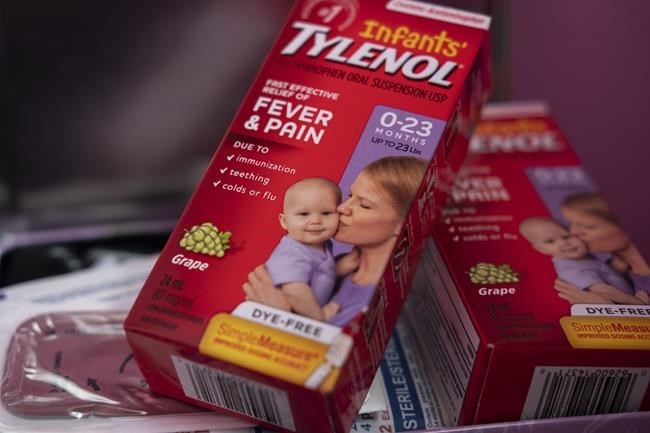OTTAWA — Health Canada officials say more doses of children's painkillers and fever medication will be available soon, but they won't say how many or where exactly they'll be sent.
Deputy Minister Stephen Lucas and several other senior Health Canada officials with responsibility for pharmaceutical policy were summoned to the House of Commons health committee Tuesday to explain why 91原创 hospitals and nervous parents with sick kids at home are finding empty shelves where children's Tylenol and Advil are supposed to be.
The shortage began last spring but was exacerbated in the summer, when an early appearance of influenza and respiratory syncytial virus coincided with the ongoing COVID-19 pandemic. Parents, worried the medicines wouldn't be available when their kids needed them, flocked to stores to stock up. Demand quadrupled.
Chief Medical Adviser Dr. Supriya Sharma said manufacturers initially told the government in the spring they could address a "tightening" in supply by increasing production. But by August, they let Health Canada know that plan was failing.
After nearly two months of discussions between governments and manufacturers, Health Canada arranged to import doses from the United States and Australia. The first U.S. shipment is already on the ground.
But frustration overflowed when NDP MP Don Davies asked at the committee meeting how many additional doses are coming in and where they are going.
Linsey Hollett, the director of health product compliance for Health Canada, said that's confidential.
"Unfortunately, I'm not able to share the exact quantities," she said.
She said distribution is being prioritized for hospitals but wouldn't say which ones, only that information provided by children's hospitals is being used to determine the need.
Hollett later clarified that Health Canada was trying to convince the manufacturers to make the information public and hoped that would happen soon.
Davies was incensed and Conservative MP Stephen Ellis called the secrecy "unconscionable."
To little avail, MPs and officials meandered for an hour around questions about when the shortage began, who is to blame and why it happened.
Lucas repeatedly told MPs that drug shortages are not unusual, are often dealt with before anyone in the public realizes there is a problem and are not unique to Canada.
Bloc Québécois MP Jean-Denis Garon asked him to name even one other country where politicians have had to demand health officials explain to a committee why kids can't get medicine to bring down their fever.
Lucas said it's true that this particular shortage is worse in Canada, but he said there are acetaminophen shortages elsewhere, including in France, Germany and Ireland.
At the end of October, France limited the purchase of acetaminophen — known in France more commonly as paracetamol — to two boxes per customer due to a shortage. Both Ireland and Germany are warning there are hundreds of drugs in short supply, including kids' fever medications.
The German pharmacists association said in mid-September that China's ongoing COVID-19 lockdowns were affecting port exports, and that the heavy reliance on China and other Asian countries to make the active ingredients in drugs such as acetaminophen and ibuprofen meant that global supply-chain issues were having an impact.
Lucas acknowledged that supply-chain woes are contributing to drug shortages.
Hollett said there are currently shortages of as many as 800 drugs in Canada, but she said most are not critical.
There are 23 drugs on the government's "tier 3" list of critical shortages that pose significant risk to patients and the health care system. The designation requires the government to assemble a committee to investigate the problem and potential solutions.
Neither acetaminophen nor ibuprofen are on the list, which is published on the government's website.Health Canada could not explain on Tuesday why they are not there.
This report by The 91原创 Press was first published Nov. 15, 2022.
Mia Rabson, The 91原创 Press
